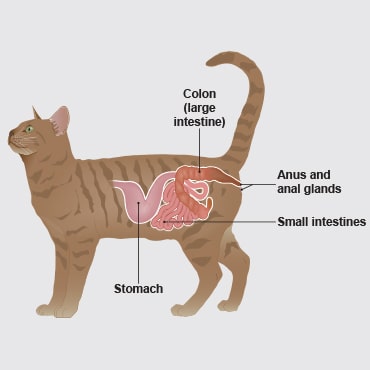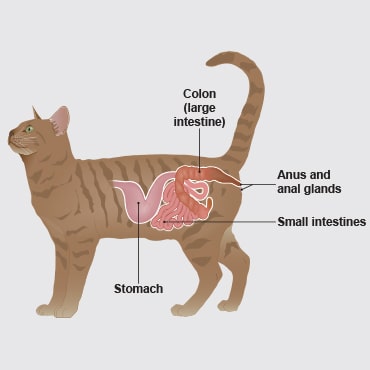As a cat parent, there’s nothing more unsettling than noticing your feline friend is experiencing some unusual symptoms. One common concern that leaves many pet owners perplexed is the presence of bloody discharge around their cat’s anus. But before you start imagining the worst-case scenarios, let’s take a closer look at this phenomenon.
Do Cat’s Infected Anal Glands Bleed?
In this blog post, we’ll delve into the world of feline anal glands and explore whether infection can indeed lead to bleeding. Whether you’re a seasoned cat owner or a newcomer to the world of whiskers and purrs, understanding the causes and treatments for your cat’s anal gland issues will give you peace of mind.
The Anatomy of Anal Glands in Cats
Before we dive into the potential bleeding aspect, it’s essential to understand what these glands do. Located on either side of your cat’s anus, anal glands are small sacs that produce a pungent secretion, which helps mark their territory by leaving their scent behind. These glands can become impacted or infected, leading to discomfort and even pain for our feline friends.
In the next section, we’ll examine the possible reasons why cats’ infected anal glands might bleed. Stay tuned!

In our previous section, we introduced the concept of anal glands in cats and explored their role in marking territory. Now, let’s examine the possible reasons why infected anal glands might bleed.
Causes of Bleeding from Infected Anal Glands
When an anal gland becomes infected, it can cause a range of symptoms, including swelling, redness, and discharge around the anus. In some cases, this discharge may appear bloody or contain blood-like particles. While bleeding is not always a sign of infection, it’s essential to understand the possible causes:
Impaction: If the anal gland becomes clogged with debris, such as hair or stool, it can cause discomfort and swelling, leading to bleeding.
Infection: Bacterial infections can occur when bacteria enter the anal gland through cuts or abrasions. This infection can cause inflammation, pain, and bleeding.
Perianal abscesses: These are pockets of pus that form around the anus, often as a result of an infected anal gland. Perianal abscesses can lead to severe pain, swelling, and bleeding.
It’s crucial to note that bleeding from infected anal glands is usually a sign of a more serious underlying issue. If your cat is experiencing bloody discharge or bleeding, it’s essential to consult with your veterinarian as soon as possible.
Your veterinarian may recommend the following treatments:
Warm compresses: Applying warm compresses to the affected area can help soothe discomfort and promote drainage.
Medication: Antibiotics or anti-inflammatory medications may be prescribed to treat underlying infections or inflammation.
Surgery: In severe cases, surgical intervention may be necessary to drain abscesses or remove impacted anal glands.
Preventing infected anal glands from becoming a problem requires regular care and maintenance. By keeping your cat’s coat clean and well-groomed, you can reduce the risk of impaction and infection.
In our next section, we’ll explore the importance of preventive care and provide tips for maintaining your cat’s overall health.
Get Expert Advice on Your Cat’s Health
We are ready to answer your questions, day or night.
Start chatIn this concluding section, let’s summarize the key points covered so far:
We explored the anatomy of anal glands in cats, understanding their purpose and potential issues that can arise. We also examined the possibility of infected anal glands bleeding, considering various factors that may contribute to this symptom.
So, do cat’s infected anal glands bleed? The answer is yes, it can happen. However, bleeding is often a sign of an advanced infection or impaction, which requires prompt veterinary attention. By recognizing the warning signs and taking proactive measures, you can help prevent or treat your cat’s anal gland issues.
As we conclude this blog post, remember that as a responsible cat parent, it’s crucial to prioritize your feline friend’s health and well-being. If you suspect any abnormalities around your cat’s anus, consult with your veterinarian promptly. They will assess the situation and provide guidance on the best course of action.
By staying informed and addressing potential issues early on, you can ensure your cat leads a happy, healthy life – free from discomfort and pain. With this knowledge, you’ll be better equipped to support your feline companion’s unique needs and maintain a strong bond with them.
As we bid farewell to this topic, remember that as a cat parent, you hold the power to make a difference in your cat’s life. Stay vigilant, stay informed, and most importantly, cherish those moments with your whiskered friend – they’ll be grateful for it!
Ask a CPA a question online free: Got accounting concerns? Get expert advice from a certified public accountant without breaking the bank! Learn how to ask the right questions and get instant answers. Click here to start: https://deltaconnect.info/ask-a-cpa-a-question-online-free/
Star interview questions for customer service, questions and best answers: Crush your next customer service interview with these top-performing questions! Discover the secrets to acing your next interview and landing your dream job. Click here to learn more: https://deltaconnect.info/star-interview-questions-for-customer-service-questions-and-best-answers/



